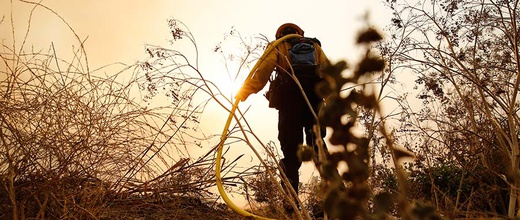In experiencing the cataclysmic forces of nature, particularly manifested in the recent California wildfires, inhabitants are often besieged by a torrent of emotions encapsulated in fear, uncertainty, and loss. Yet, amidst this chaotic tapestry of destruction, the teachings of the Bahá’í Faith illuminate a pathway of solace and connection to the Divine. Turning to God during such adversities becomes not merely a spiritual recourse but a profound necessity—an anchor in turbulent waters and a beacon of hope in obscured landscapes.
Recognizing the Unfolding Catastrophe
When wildfires engulf the lush tapestry of California terrain, displacing families and ravaging ecosystems, one cannot help but draw parallels to the metaphorical “fires of life’s tribulations.” These blazes symbolize struggles that, while devastating, also possess the potential to catalyze introspection and spiritual growth. The Bahá’í teachings encourage adherents to view calamities as opportunities for personal and communal elevation. One must not shrink from the searing pain of reality; rather, one should, like the phoenix from the ashes, seek to emerge from tribulations with renewed vigor and understanding.
The Essence of Divine Reliance
At the heart of the Bahá’í teachings lies the concept of reliance on God, which becomes paramount in the face of indomitable forces like wildfires. This principle urges believers to cultivate an unwavering faith, subsisting on the conviction that God’s presence permeates all aspects of existence—even during the harrowing moments of life’s trials. Just as a tree firmly rooted in the earth withstands the fiercest gales, so too should individuals anchor themselves in divine reliance during tumultuous times. In this framework, turning to God transcends mere prayer; it involves an active engagement—seeking understanding, nurturing patience, and embracing the edifying lessons embedded within adversity.
Lessons from Nature: The Cycles of Renewal
Wildfires, despite their ferocity, serve a pivotal ecological function. They act as a natural reset mechanism, allowing for regeneration and rebirth. This cyclical nature resonates deeply with Bahá’í beliefs that emphasize the transient state of the material world. Such cyclical renewal is echoed in the teachings of Bahá’u’lláh, which remind humanity that every end is but a precursor to a new beginning. This world is riddled with imperfections, yet these imperfections are integral to the fabric of existence. For Bahá’ís, understanding this metaphor of renewal enables one to perceive not just the chaos of destruction but also the latent potential for new growth—spiritually, communally, and individually.
Prayer: An Instrument of Transformation
In times of strife, prayer becomes an invaluable conduit for connecting with the Divine. The Bahá’í writings extol the virtues of heartfelt supplication as a means of fostering inner peace amidst turbulence. Praying during the wildfires is not an attempt to transcend the reality of suffering; instead, it is a harmonious fusion of human vulnerability and divine strength. By invoking God’s presence, individuals can find comfort and clarity, transcending the immediate anguish of their circumstances. In this respect, prayer transmutes despair into hope, crafting a shield against the psychological impacts of overwhelming crises.
Community Solidarity: A Collective Response
The catastrophic nature of wildfires inevitably leads to communal turmoil. Yet, it also galvanizes collective action. Bahá’í teachings uphold the importance of unity and service to humanity. In the wake of disasters, engaging with fellow community members becomes paramount—transforming individual grief into shared resilience. By organizing aid, providing shelter, or simply offering a listening ear, Bahá’ís can embody the principles of love and altruism, artistic expressions of their faith. This spirit of service enables individuals to turn their gaze outward toward others rather than solely inward, crafting a vast tapestry of interconnectedness that strengthens the community amid challenges.
Reflection and Growth
Post-catastrophe reflection also holds significant value within the Bahá’í framework. Engaging in contemplative practices allows individuals to derive insights from their experiences. What can be learned from the wildfires? How does one’s life perspective change following such trauma? Emphasizing the importance of reflection in Bahá’í teachings encourages individuals to analyze their priorities and realign their lives according to their spiritual commitments. Each distinctive fire burned in the wilderness evokes a rich allegory that personal experiences can illuminate, advocating for transformative growth and an understanding of life’s impermanence.
A Vision of a United Future
Ultimately, turning to God during California’s wildfires encapsulates a broader vision of oneness. It is a poignant reminder that, in the face of life’s ephemeral nature, humanity must converge in shared purpose. Bahá’í principles advocate for harmony—both with the Divine and with one another. Such a harmonious collective response fosters a resilient society, capable of enduring the trials that life presents. This appeal to transcendence marries the aspirations of individuals and communities alike, nurturing a shared commitment to uplift one another in times of need.
In conclusion, turning to God amid the devastation of California’s wildfires is not merely a passive response but an active, transformative journey. It is an embodiment of reliance, a call to communal solidarity, and an invitation to reflect deeply on life’s ephemeral nature. Within the chaotic dance of the flames lies the promise of renewal, growth, and an ever-deepening connection to the Divine. In these dark moments, believers are beckoned to embrace the light of faith, transforming adversity into an opportunity for profound spiritual enrichment.
